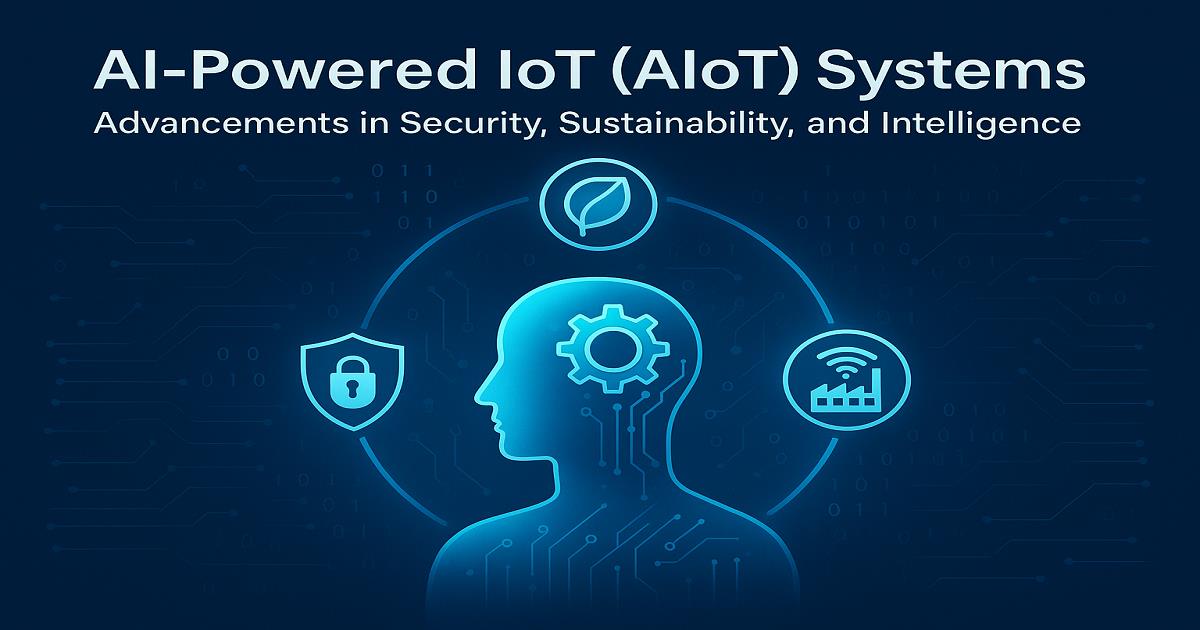AI-Powered IoT (AIoT) Systems: Advancements in Security, Sustainability, and Intelligence
A special issue of Computers (ISSN 2073-431X). This special issue belongs to the section "Internet of Things (IoT) and Industrial IoT".
Deadline for manuscript submissions: 30 June 2026 | Viewed by 834

Special Issue Editor
2. School of Computer Science and Technology, Algoma University, Sault Ste. Marie, ON P6A 2G4, Canada
Interests: artificial intelligence of things (AIoT); generative internet of things (GIoT); cybersecurity; federated learning; internet of medical things (IoMT); healthcare security
Special Issues, Collections and Topics in MDPI journals
Special Issue Information
Dear Colleagues,
The rapid convergence of Artificial Intelligence (AI) and the Internet of Things (IoT) is revolutionizing how connected systems sense, learn, and act autonomously across diverse environments. This Special Issue (SI) highlights the latest research and advancements in AI-powered IoT (AIoT) systems that enable intelligent decision-making, real-time analytics, and adaptive automation. It welcomes contributions that address the integration of machine learning, deep learning, and generative AI with IoT infrastructures to improve scalability, resilience, and energy efficiency. In addition, this SI underscores the growing importance of Responsible AI and Explainable AI (XAI) to ensure fairness, transparency, accountability, and trustworthiness within AIoT ecosystems. Submissions that explore how ethical frameworks, interpretable models, and human-in-the-loop approaches can guide secure, privacy-preserving, and sustainable IoT deployments are particularly encouraged. Overall, the goal is to provide a comprehensive view of how AI-driven intelligence can transform IoT networks into adaptive, ethical, and context-aware systems that benefit society and industry alike. The topics can include, but are not limited to, the following:
- Federated and distributed learning for IoT devices;
- Generative AI for adaptive IoT security and optimization;
- Responsible and explainable AI frameworks for IoT applications;
- Human-in-the-loop and interpretable decision systems for IoT;
- AI-driven energy management in IoT and smart grids;
- Privacy-preserving data aggregation and edge intelligence;
- Reinforcement learning for autonomous IoT systems;
- AI-enabled predictive maintenance in Industry 4.0;
- Trust, authentication, and blockchain integration in AIoT;
- Lightweight deep learning models for constrained IoT devices;
- LLM-based context understanding in smart environments;
- Ethical and sustainable AIoT system design.
Dr. Yazan Otoum
Guest Editor
Manuscript Submission Information
Manuscripts should be submitted online at www.mdpi.com by registering and logging in to this website. Once you are registered, click here to go to the submission form. Manuscripts can be submitted until the deadline. All submissions that pass pre-check are peer-reviewed. Accepted papers will be published continuously in the journal (as soon as accepted) and will be listed together on the special issue website. Research articles, review articles as well as short communications are invited. For planned papers, a title and short abstract (about 250 words) can be sent to the Editorial Office for assessment.
Submitted manuscripts should not have been published previously, nor be under consideration for publication elsewhere (except conference proceedings papers). All manuscripts are thoroughly refereed through a single-blind peer-review process. A guide for authors and other relevant information for submission of manuscripts is available on the Instructions for Authors page. Computers is an international peer-reviewed open access monthly journal published by MDPI.
Please visit the Instructions for Authors page before submitting a manuscript. The Article Processing Charge (APC) for publication in this open access journal is 1800 CHF (Swiss Francs). Submitted papers should be well formatted and use good English. Authors may use MDPI's English editing service prior to publication or during author revisions.
Keywords
- AIoT
- internet of things
- artificial intelligence
- edge computing
- federated learning
- responsible AI
- explainable AI
- smart systems
- cybersecurity
- privacy preservation
- deep learning
- generative AI
- edge–cloud collaboration
- ethical AI
Benefits of Publishing in a Special Issue
- Ease of navigation: Grouping papers by topic helps scholars navigate broad scope journals more efficiently.
- Greater discoverability: Special Issues support the reach and impact of scientific research. Articles in Special Issues are more discoverable and cited more frequently.
- Expansion of research network: Special Issues facilitate connections among authors, fostering scientific collaborations.
- External promotion: Articles in Special Issues are often promoted through the journal's social media, increasing their visibility.
- Reprint: MDPI Books provides the opportunity to republish successful Special Issues in book format, both online and in print.
Further information on MDPI's Special Issue policies can be found here.





